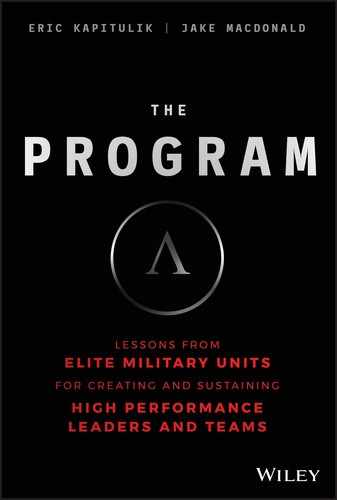66
Focus on Strengths, Address Weaknesses
SUPPORTING THE ELECTIONS in Afghanistan would be the biggest, most dynamic, and high-profile mission that Stacey and the FET had been on up until that time. There was not, however, any precedent for what supporting a politically charged, volatile national election might entail. They weren’t given a handbook that laid out all the training the FET should conduct in order to be successful at their assigned mission. Despite the uncertainty, the FET charged forward knowing their strengths and their weaknesses. They focused on their strengths in order to maximize their use when an enemy appeared. A weakness may never become a strength, especially in the short term, and if more talent is required. We are all talented at certain things and not talented at others. Our weaknesses must still be addressed, though. Stacey and her FET teammates addressed their weaknesses daily to ensure that when the enemy appeared, at the very least, those weaknesses could not, and would not, be exploited. We all have strengths on which we must focus to ensure that we can use them to their utmost in accomplishing our mission. We also all have a vulnerability, a weakness in our game or our personality that can hurt our ability to be the most successful individuals and teams on our chosen battlefields. We all have that something that, if improved, will make us a better athlete, salesperson, doctor, director of HR, or marketing or customer service rep—something that will make us a better parent, a better teammate, a better team leader. We should focus on our strengths, but address weaknesses too. Like Stacey and her FET teammates, it will allow us to accomplish our own missions. Write down one thing that you do well that helps the team win. Then write down one thing that, if addressed, would help the team win even more. Author Simon Sinek calls a version of this a Team Effectiveness Exercise. We call it “A Way to Determine Our One More.” Try not to think about it as a strength and a weakness. Think about it as something you already do that helps the team win and then something that, if addressed, would help the team win even more. Ask a teammate to do the same for you. The teammate can be our spouse, partner, athletic teammate, coach, CEO, friend, or mentor. The more teammates we can get to do it for us, the better. Tendencies will start to appear. Keep feedback focused on behaviors rather than on a talent or performance. For example, “Your work ethic is the best of anyone on the team,” rather than “You are always our number one salesperson.” For areas of improvement, “You need to be more emotionally resilient; you react emotionally, rather than passionately.” Highlighting this behavior is more impactful than the performance to which it leads: “You get too many technical fouls.” Focus on areas that are choices for ourselves and for teammates. The Program’s “A Way to Determine Our One More” can be conducted in a group setting or individually. Once we have determined the behavior that, if addressed, would help our team accomplish its mission better, more efficiently, more easily, or with greater frequency, we must then decide how much time of each day we devote to it. One hour? Two? More? We recommend eleven minutes. Devote eleven minutes every single day to doing that thing that, if addressed, would help us and/or our team to win more, to do better. Unfortunately, we will not see a difference tomorrow, or next week. That isn’t the way our lives work. We all want instant gratification. That’s normal. Its occurrence is not! As Darren Hardy points out in The Compound Effect, if offered either $3 million today or a penny compounded for a thirty-one-day month, almost everyone would choose the $3 million. Unfortunately, that isn’t the way our lives work. We aren’t given $3 million (or at least most of us aren’t). We want instant gratification, but we don’t get it. Instead, we get pennies. A penny represents a good or bad decision in every aspect of our lives. In this example, our initial penny will be good decisions, but our bad decisions compound just as effectively. One “good” penny becomes two pennies on Day 2. It becomes four pennies on Day 3 and eight pennies on Day 4. After a week, that penny is worth 64 cents. After two weeks, our good decisions have compounded to be worth $81.92. This is the time when most people stop making good decisions. If we make good decisions, after two weeks, we only have $81.92 and we compare ourselves to our teammate or neighbor, whom we perceive to have $3 million. We get frustrated, disappointed, or discouraged and we stop making those good decisions. However, if we instead choose to focus on making good decisions rather than on outcomes or what we think our neighbors have, then after twenty-nine days, we have $2.5 million. It still is not as much as the $3 million, but close. On the thirtieth day though, our good decisions have compounded to $5 million! On the thirty-first day, they are worth $10 million. Rest assured that on the thirty-first day, after choosing to make hundreds or thousands of daily good decisions, sacrificing, doing One More™, we will wake up in the morning and everyone will tell us how lucky we are. Success has very little to do with luck, though. Thinking it does is just the way others cope with their own lack of discipline and unwillingness to make those same thousands of good decisions—their unwillingness to committing to One More™. One More™ has nothing to do with luck or talent. One More™ is a choice. Make better choices. Focus on strengths. Address weaknesses. And commit to doing so for a very long time. Great choices, like pennies, add up, and produce great achievements.Determine Our One More™
Compounding Our Choice to Do One More™
